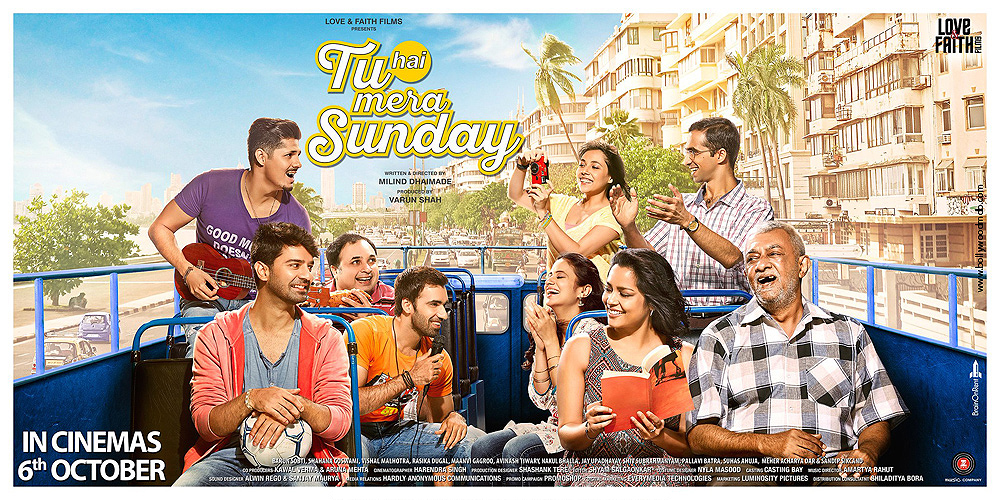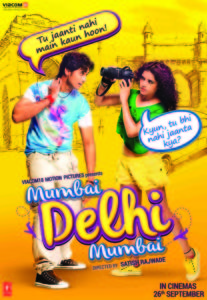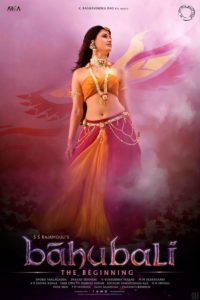I spent my Saturday afternoon watching ‘Tu Hai Mera Sunday’ which turned out to be a nostalgic ride! Despite Bollywood breathing and thriving in the embrace of ‘Amchi Mumbai’ there are only a handful of films that have captured the ethos and the charm of this metropolis on celluloid, not just with their urbane settings but also by showcasing the common citizens entwined in their everyday wanderings. Where the characters are uncomplicated, not vying for attention or fighting for screen space, yet leaving audiences enthralled with their storyline alone. A few weeks prior I came across such a film, Netflix’s ‘Love Per Square Foot’, and today it was time to catch up with another ‘Made in Mumbai’ movie with ‘Tu Hai Mera Sunday’. Released last year, it was critically acclaimed and well-received, but as usual, it was buried deep within the debris of its box-office performance.
‘Tu Hai Mera Sunday’ revolves around an ensemble cast of 5 fun-loving buddies who reckon Sunday isn’t about getting comfy within their homes. So they routinely engage in a game of football at Juhu Beach, one of Mumbai’s characteristic destinations where locals assemble to escape the drudgery. However, on one such fateful trip, the group is joined by an ‘Appa’ who boots the ball harder to whack on the head of a local dignitary decisively ending their sporting sojourns on the beach. Would it bring an end to their passion? I believe not. Because football defines their urge to chug along, it’s their only chance at redeeming their spirits be it from an unruly boss, abject solitude, a cacophonous family, or mundane life in general. So alongside Appa, the group begins scrambling for a new playground, and from within that emotional journey, they discover their true personalities. I wouldn’t miss this fun-filled outing, even if it’s a Sunday!


 I had cherished the
I had cherished the  After brooding over my choice to watch the Baahubali films (BB) for years I finally garnered the motivation to catch up on the series yesterday, both flicks back-to-back. Frankly, I have become sceptical to watch mythological/historical period films with the current spate of drab historical Bollywood offerings not providing any entertainment value per se. And then BB fell into the category of ‘dubbed’ Hindi cinema, the ones made in the South but rarely given its due production importance for its Northern masses. It does remind me of the LOTR series but being made in India on such a grand scale (the CGI, et al) made this series that much more compelling to watch. Here’s the funny part – back then I couldn’t wrap my head around the whimsical Internet memes on “Katappa Ne Baahubali Ko Kyun Maara?” (Why did Katappa kill Baahubali?), but after watching ‘The Beginning’ that question came to haunt me too as it did millions of fans in 2015. Luckily, I didn’t have to wait for a year for the sequel (‘The Conclusion’) to get my answer.
After brooding over my choice to watch the Baahubali films (BB) for years I finally garnered the motivation to catch up on the series yesterday, both flicks back-to-back. Frankly, I have become sceptical to watch mythological/historical period films with the current spate of drab historical Bollywood offerings not providing any entertainment value per se. And then BB fell into the category of ‘dubbed’ Hindi cinema, the ones made in the South but rarely given its due production importance for its Northern masses. It does remind me of the LOTR series but being made in India on such a grand scale (the CGI, et al) made this series that much more compelling to watch. Here’s the funny part – back then I couldn’t wrap my head around the whimsical Internet memes on “Katappa Ne Baahubali Ko Kyun Maara?” (Why did Katappa kill Baahubali?), but after watching ‘The Beginning’ that question came to haunt me too as it did millions of fans in 2015. Luckily, I didn’t have to wait for a year for the sequel (‘The Conclusion’) to get my answer.